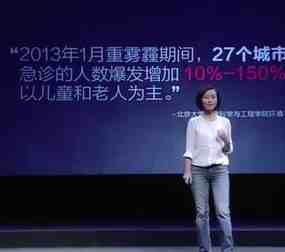For the past few days, the online community in China has been abuzz over a 104-minute documentary, Under the Dome, that has galvanised the population and even major investment banks who believe it may just tip the balance against fossil fuels in the world’s biggest polluter.
Under the Dome, a documentary on air pollution produced by Chai Jing, a former CCTV investigative journalist who had already reached celebrity status in China, has been viewed more than 200 million times in its first four days of release.
It has been widely applauded in the online community, and, most pointedly, drew praise from Chen Jining, the newly appointed Environmental Protection Minister, who thanked the film maker for bringing public attention to China’s chronic pollution issues.
Already, its potential impact is being compared – by investment banking giant Merrill Lynch – to Al Gore’s An Inconvenient Truth, and Rachel Carson’s A Silent Spring for its potential impact on the coal industry. Because of its endorsement by the Chinese government, Under the Dome could be even more powerful.
Indeed, Merrill Lynch said in a note to clients that the film’s impact could spell bad news for coal miners, coal generators, and oil refiners, and it could also cause ripple effects through the Chinese debt markets, even to the point where the Chinese currency might have to be devalued.
The anti-pollution measures Merrill Lynch anticipates as a result of the film “may also cause some collateral damages with financials – more debts from heavy polluters may go bad and also loan growth to these sectors may slow – and potentially pressurize RMB to devalue as domestic cost base rises.” If that sounds dramatic, it simply underscores the systemic risks of unabated fossil fuels. Even the Bank of England is alive to those.
Under the Dome took one year to make, and included many first-hand field trips and interviews with various government officials, industry experts and polluting companies.
According to the BBC, Chai used here own money, around $A180,000, to fund the film, which she decided to make after her infant daughter developed a benign tumour in the womb. Chai blamed the tumour on air pollution.
In the film, Chai stands in front of an audience in a simple white shirt and jeans, looking at the causes of the country’s noxious air pollution.
Pointedly, Chai says the severe pollution has been caused by compromises on environmental protection caused by the fear of officials of economic slowdown and unemployment from closure of illegally polluting enterprises. “It just doesn’t work to sacrifice employment for the environment,”Chai is told by one government official.
As a result, the film noted, the Environmental Protection Bureau did not have the ability to enforce environmental laws and stop illegal pollution activities, to the point where few if any had been penalised and bad practices had even become industry norms in some cases.
According to the BBC, near the start of the film, Chai interviews a six year old girl in the coal-mining province of Shanxi, one of the most polluted places on earth.
“Have you ever seen stars?” Chai asks. “No,” replies the girl.
“Have you ever seen a blue sky?” “I have seen a sky that’s a little bit blue,” the girl tells her.
“But have you ever seen white clouds?” “No,” the girl sighs.
It is no accident that the film is now being compared to the work of Carson and Gore.
Carson’s powerful book led to controls on pesticides, the banning of DDT, and to the creation of the US Environmental Protection Agency, which is just now cracking down on coal pollution in the US, despite efforts by the Republicans to curb its powers.
Gore’s film, of course, helped lead to a complete re-assessment of environmental policies, a process that has helped lead to the creation of carbon markets, a global push to renewables, and efforts to address the impacts of climate change.
In China, the support by the government for the film is critical. In his first media conference, Chen stressed the need to enforce the amended Environmental Protection Law (which came into effect 1 Jan 2015), information transparency and more interaction with the public going forward.
“We expect pollution control to be the intensive focus of this government over the next decade,” Deutsche Bank analysts wrote. “We also expect increased efforts to reduce coal consumption and promote alternative energy. This will create more investment opportunities for the leading companies in the environmental related sectors.
China in 2014 reduced the amount of coal-fired generation by 2.9 per cent, which some analysts suggest could signal a peak in coal consumption, air pollution, and presage a peak in carbon emissions sometime soon.
Last year, an agreement on climate change by President Xi Jinping and US President Barack Obama was hailed as a game-breaker for international climate negotiations. China agreed to a peak in emissions before 2030, but most analysts believe it will occur well before then.
Certainly, the film has unleashed a huge national debate in China.
Merrill Lynch, in a note to clients on Wednesday, agreed: “It’s very clear from (the film’s) popularity that the public is fed up with pollution in general, and smogs in particular (see chart below). We suspect that some segments of the government may seize the public anger and push ahead with some meaningful pollution control measures.”
As a result, Merrill Lynch identified coal miners, oil refiners, coal generators, and steel makers among those sectors that could suffer financially if the government responds to the video, and the public outcry and tries to address the key issues raised by the program.
Coal could face further falls in consumption, and could face requirements to be washed; oil refiners could face more stringent fuel standards, steel mills, cement makers and coal fired power stations may face restrictions; and even shippers and trucking companies could face pollution controls.
“On the other hand, tighter air pollution controls may benefit clean fuels, such as gas, solar, wind, and nuclear, environment protection equipment makers (e.g., air purifiers), rail, large heavy truck makers (their less scrupulous competitors are forced out) and services sector broadly.”
Deutsche also took the opportunity to recommend investors look at cleantech stocks, in particular GCL Poly, which supplies silicon to the solar industry, and water companies BEWG and GDI.










